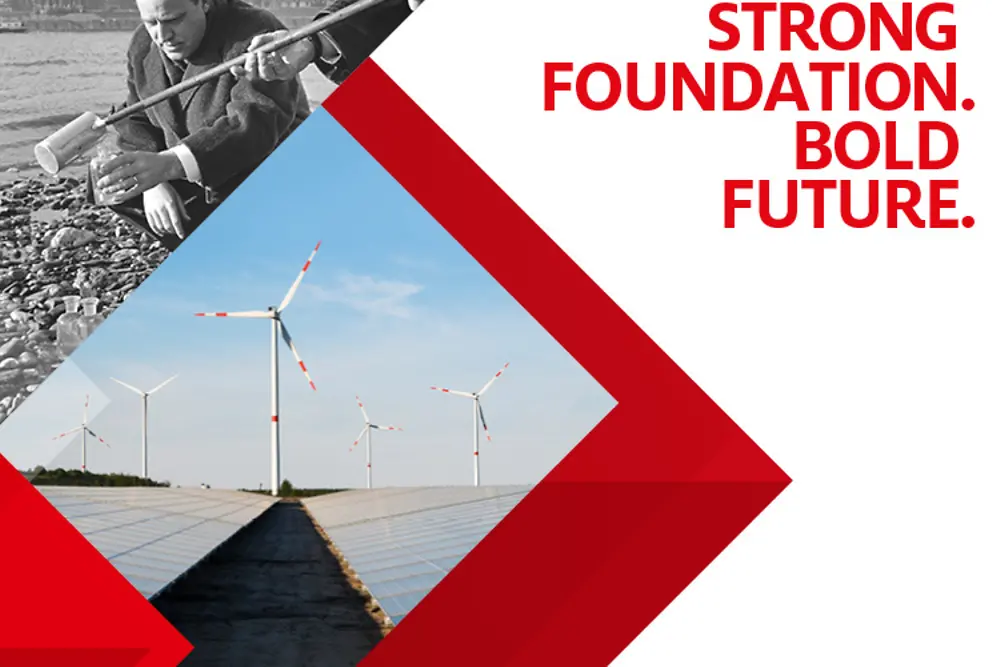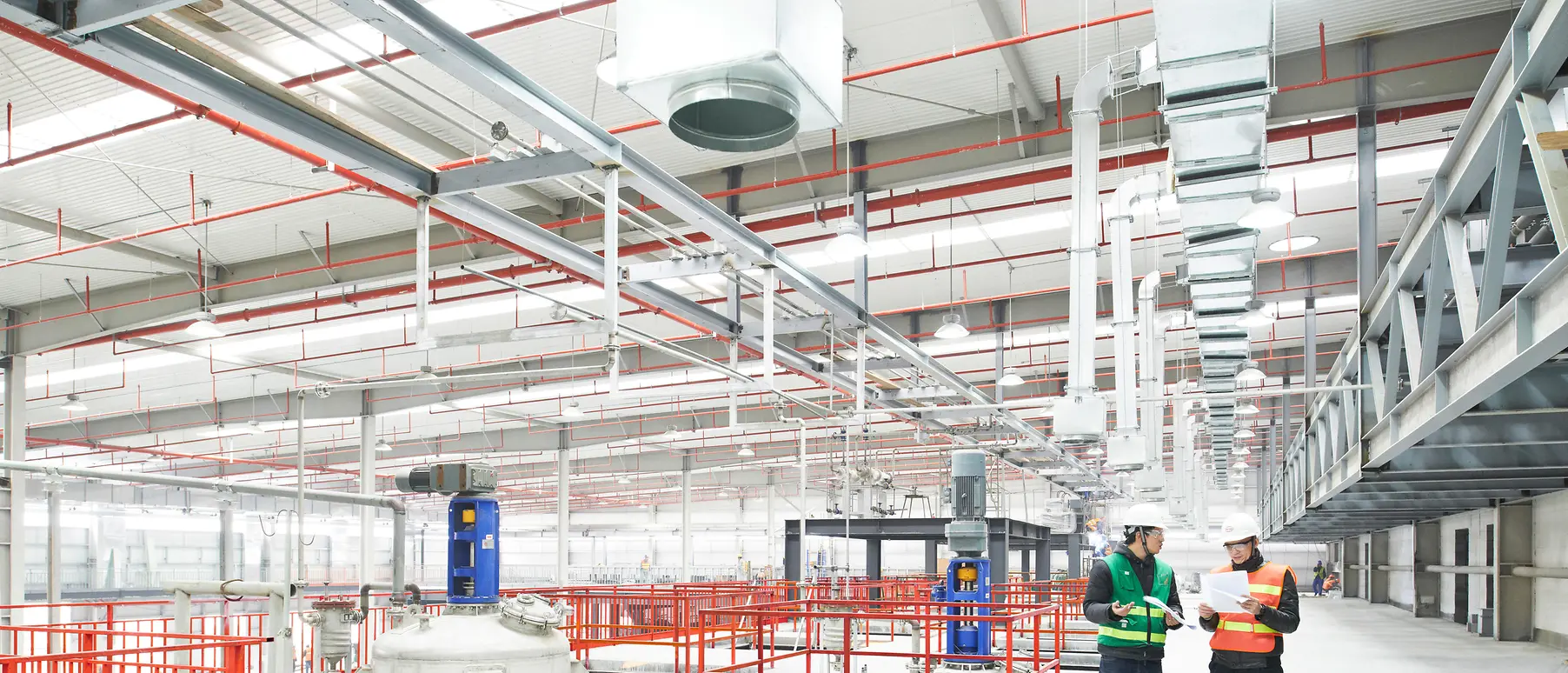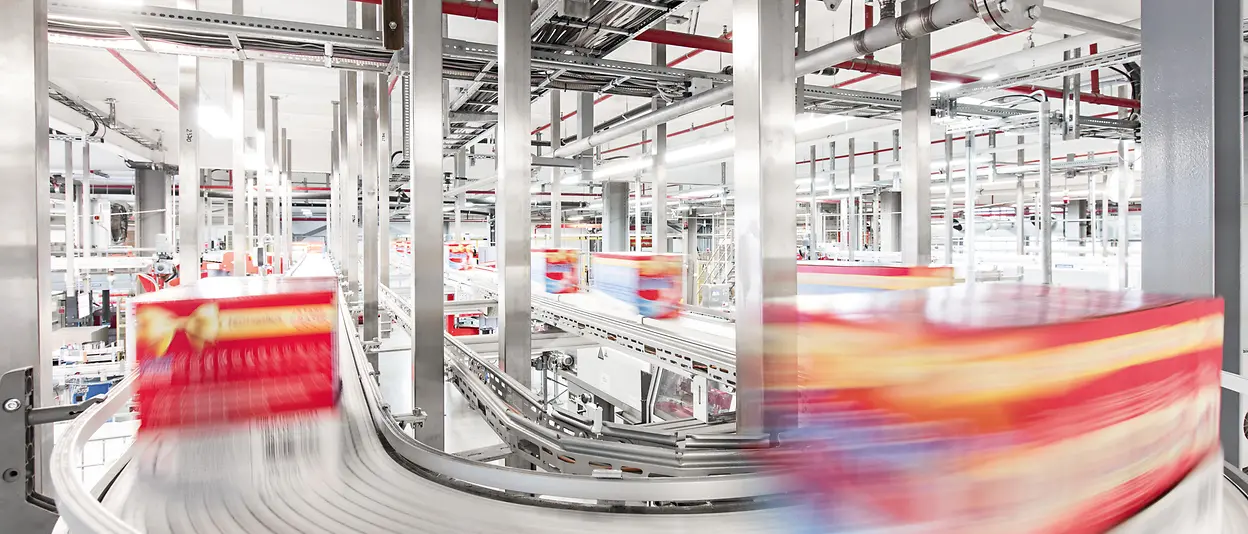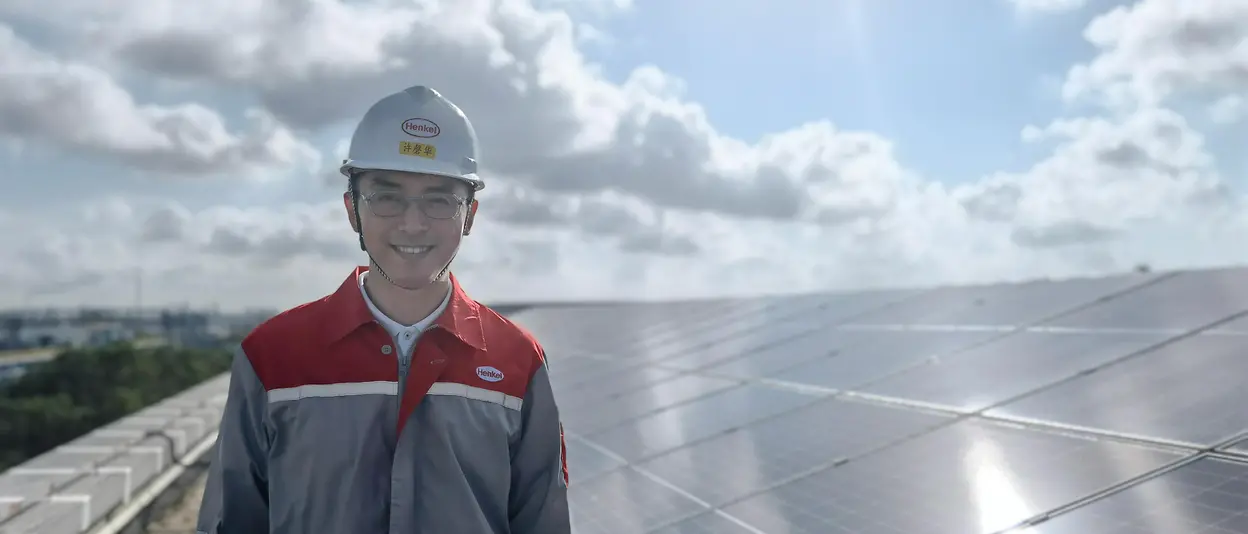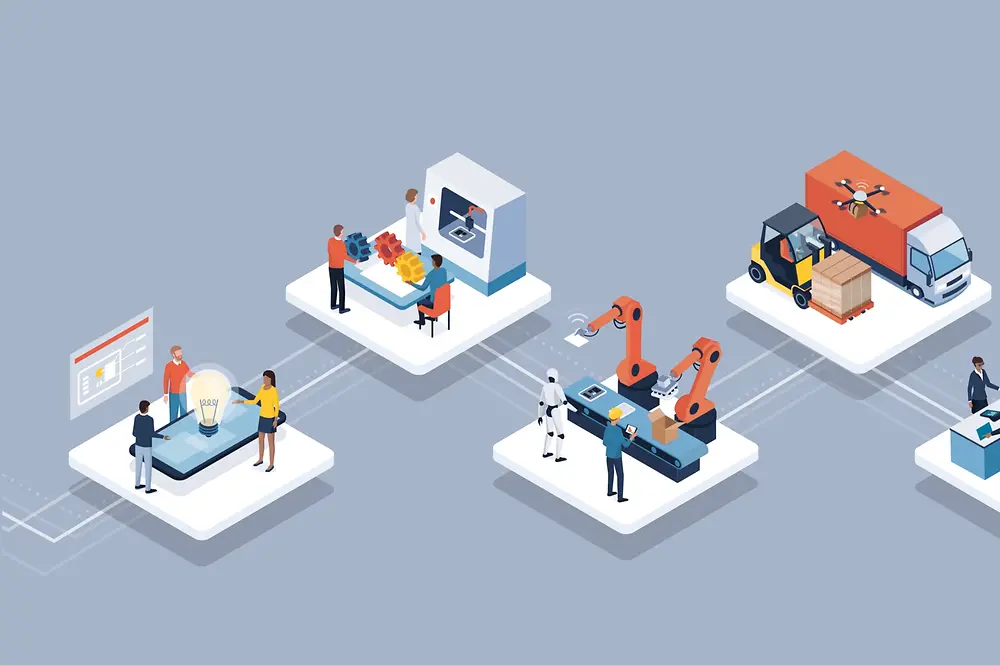Learn more about Henkel Brands & Businesses in UK & Irelands: Includes useful information about the brands, technologies and latest innovations in our business areas: Henkel Adhesive Technologies and Henkel Consumer Brands.
Big factories, smaller footprint
It’s always possible to improve. That’s the mindset of our production teams around the world, who constantly strive to boost energy efficiency and reduce the environmental footprint of our factories. Two site managers, Carlos Beristain from our Laundry & Home Care facility in Düsseldorf and Qinghua Xu from our Adhesive Technologies plant in Shanghai, shared insights into how digital technologies and constant optimization are driving safety and sustainability at these two award-winning locations.
Tell us about your production site.
Carlos: Our production facility in Düsseldorf is the second largest site for our Laundry & Home Care business unit. We’re proud that it’s where everything started – and it’s also where new things happen. We received a couple of awards for 2020, including being named as a Lighthouse Factory by the World Economic Forum and receiving recognition as the Factory of the Year from the Excellent Production Network. We currently produce about 400,000 tons of our products each year at this location, ranging from heavy-duty detergents through to dishwasher tabs and hard surface cleaners.
Qinghua: That’s very impressive! In comparison, Henkel’s Dragon Plant in Shanghai is fairly new. The site opened in 2013. As the largest adhesives production site in the world, Dragon Plant exclusively produces for our Adhesive Technologies customers. We currently manufacture 150,000 tons of product per year, which is mainly adhesives that are used in the packaging, automotive and electronics industries.
What technologies and features have you implemented at your site?
Carlos: In Düsseldorf, we are working hard to advance data-driven decarbonization. With our globally rolled-out energy-metering system, we monitor all of our energy consumption worldwide. This includes the energy consumed in our spray-drying towers, where we produce the base powder for our solid detergents. This process accounts for a significant share of the total amount of energy consumed by our Laundry & Home Care business unit in Düsseldorf. Collecting more data about the energy consumed during this process opens up opportunities to increase efficiency and reduce the related carbon footprint. And we make all of this data available within our global digital backbone system.
We are now going a step further by gradually installing additional sensors inside and outside of the spray-drying tower in Düsseldorf. This will enable us to gather more data, which can then be used to further optimize the way the tower operates by improving the control system. Our factory in Düsseldorf is piloting this approach, and we plan to roll it out to our other powder production sites in the future. We are convinced that following a data-driven approach and sharing insights across our production network will help us identify opportunities to keep increasing energy efficiency at all of our sites.
Quinghua: Since the Dragon Plant began operating in 2013, we have taken every possible step to further decrease our site’s environmental footprint – an important factor that we also considered while designing and building the factory. This includes a range of measures that aim to reduce wastewater and cut energy consumption. Since January 2021, we have also been getting some of our power supply from solar panels that are installed on our special translucent roof. On top of our efforts to ensure energy-efficient production, we are also helping our employees to adopt a more sustainable lifestyle by offering charging stations for e-cars. Importantly, all of these projects and investments pay off financially. I think this proves that environmental progress and cost efficiency are closely connected.
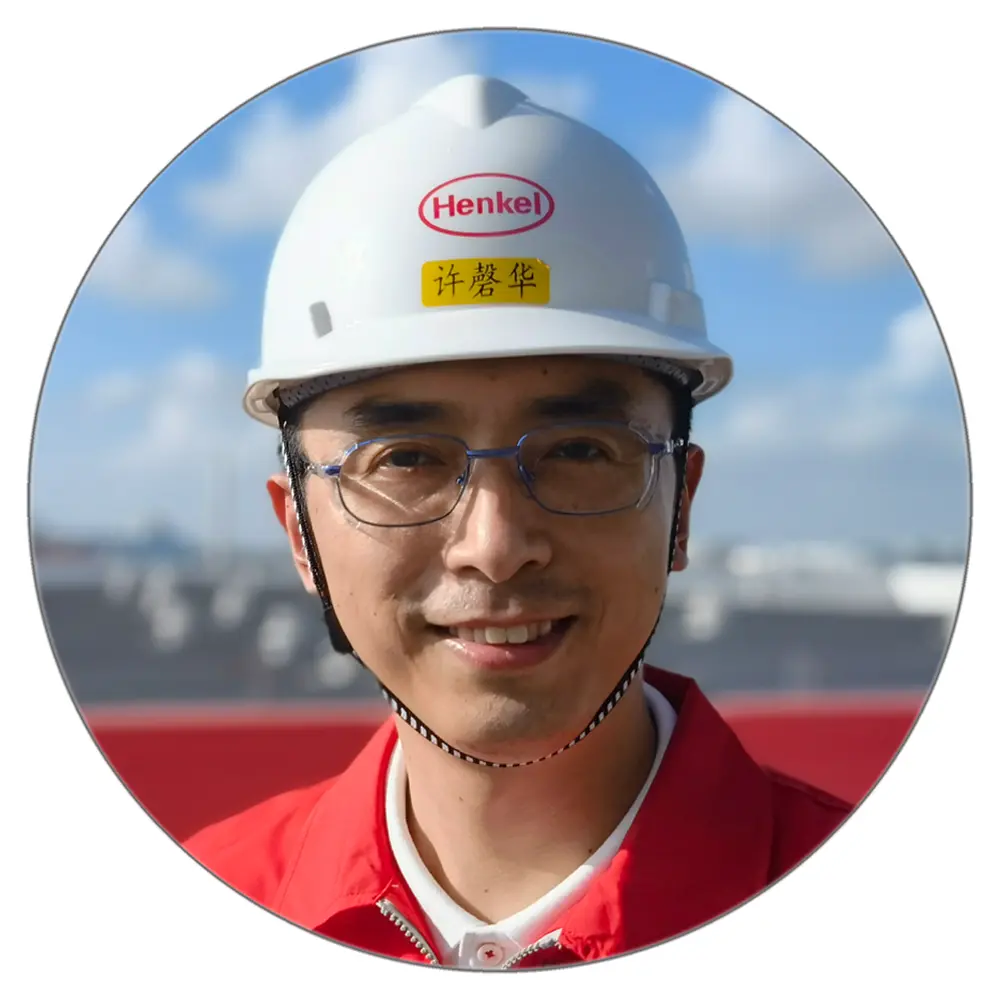
We have been taking every possible step to further decrease our site’s environmental footprint.
Qinghua Xu, site manager at the Adhesive Technologies “Dragon” plant in Shanghai
What role does renewable energy play?
Carlos: Our Laundry & Home Care site in Düsseldorf is about to hit a huge milestone on our journey toward reducing our carbon footprint. We are striving to become carbon neutral by 2022, and this will only be possible if we switch to renewable energy, including using biogas for several processes. Clearly, we will continue working hard to maximize energy efficiency, and switching to renewable energy is a big focus!
Quinghua: Renewable energy is clearly the future, and we are exploring various ways of increasing the proportion of our energy supply that we source from renewables. This is also what our customers expect from us. They share our strong commitment to reducing the environmental footprint of the entire value chain. For this reason, we have installed systems that help us to calculate the amount of solar energy used by each individual machine. Why does this matter? Because it means we can support our customers by giving them detailed information about the energy that is used to produce the specific technologies that they buy from us.
What are your proudest achievements from last year, and what motivates you for the future?
Carlos: When I look at our advanced digital backbone, I feel incredibly proud. It is great to see how much we can achieve by leveraging digitalization as an opportunity for transformation. One example: Since the introduction of our online energy-metering system in 2013, we have reduced our energy consumption by 26% worldwide. This enables us to identify hidden potential for improvements within each factory, while transparent benchmarking between the sites makes it possible to identify and share best practice examples. With the modular approach of our digital backbone, we can add new elements in a flexible way, just like we did for our spray-drying process. The World Economic Forum has recognized Henkel as a frontrunner in the 4th Industrial Revolution for the second time, which is a great sign that our team is on the right track – and motivates us to continue our good work.

It is great to see how much we can achieve by leveraging digitalization as an opportunity for transformation.
Carlos Beristain, site manager at our Laundry & Home Care production in Düsseldorf
Quinghua: The most exciting thing for me is that Dragon Plant has achieved significant and systematic improvements in safety, quality, sustainability and productivity. Last year, we received second place in the Operational Excellence category within the Henkel Global Lion Awards. We are all proud of being the flagship site in Asia-Pacific.
As Carlos mentioned, it’s exciting to see digitalization gain momentum. Automation that is driven by Artificial Intelligence (AI) is transforming the future of manufacturing and supporting leaner operations and increased performance, while also decreasing costs and carbon emissions. Henkel is clearly a pioneer in this area. The way we adopt AI and combine it with our products in a holistic manner is supporting our ambitions to promote a circular economy. That is a big transformation, and we are motivated by our goal of achieving it in the future.
How do you plan to make the site even more sustainable in the future, and what role do employees play in this?
Carlos: Our next big milestones are to implement the automatic control system for our spray-drying tower and to become a carbon-neutral production site by 2022. Additionally, we want to expand our digital backbone. It is a powerful data engine that provides a large amount of truly relevant, up-to-date data that enables detailed analysis. This opens up opportunities for a wide range of measures that contribute to our Sustainability Strategy. Our people are the key to making this possible. We constantly strive to engage all of our employees for sustainability and empower them to contribute in every possible way.
Quinghua: At Dragon Plant, we combine top-down and bottom-up approaches. Henkel has a strong commitment to sustainability. In Adhesive Technologies, every site in Asia-Pacific has a detailed plan for how to limit waste, reduce energy consumption and save water each year. This involves a lot of projects that we then divide into smaller workstreams and implement together. The daily actions of every employee are also important. To give more weight to their contributions, we encourage employees to get engaged. How? We use apps where our employees can collect and share their ideas for improvement. We also present awards to celebrate engagement and keep everybody motivated.
How do you incorporate sustainability into your private life?
Carlos: This is always easier to say than to do. To really make an impact, you need to change your mindset. I try to think about the consequences of my actions at all times, and to adopt this way of thinking in everything I do – from showering in the morning through to considering the way we conduct operations at our site. Basically, it’s about thinking before acting.
Quinghua: I totally agree. We can all do our bit by generating less waste, using public transport and generally rethinking our lifestyle choices. We can only make a positive impact if we fundamentally change the way we think. This is up to all of us, so we all need to act as ambassadors and spread the word about the little things that everyone can do.
INDUSTRY 4.0
HOW DIGITALIZATION TRANSFORMS PRODUCTION AND LOGISTICS
It’s efficient, digital, sustainable, connected, and smart. But what exactly is Industry 4.0? It’s the buzzword surrounding the fourth – and completely digital – revolution. After the steam engine and the assembly line, the computer brought about the third industrial revolution. Now, digitalization is transforming the industrial process once more. By taking advantage of this rise in automation, sensorics, data exchange and analytics in real time, companies are producing and delivering products smarter, faster and more efficiently, thereby opening a new world of possibilities.
SPOTLIGHT
MAGAZINE
MAGAZINE
Discover our features with stories and expert insights on innovation, sustainability, digitalization and Henkel’s pioneering culture.

